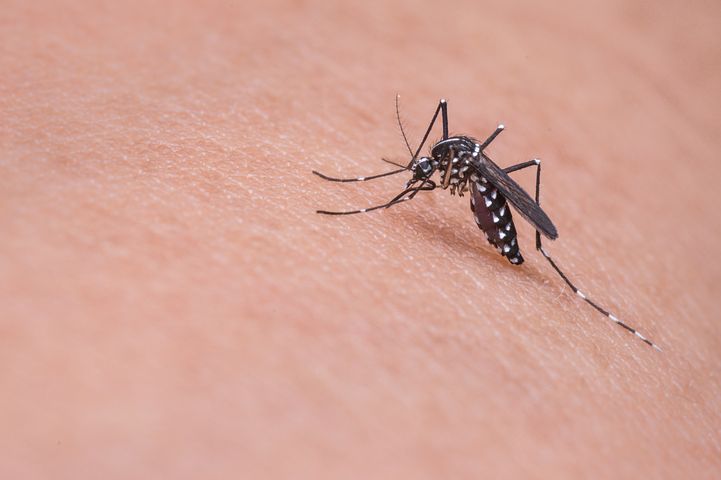Tulsa Health Department’s Mosquito Surveillance Program Detects Mosquitoes Carrying West Nile Virus

TULSA, OK – [May 9, 2019] – Tulsa Health Department officials confirmed that a sample of mosquitoes from a trap in Tulsa County has tested positive for West Nile virus (WNV). It is important for residents to remember to take precautions against WNV and other mosquito-borne illnesses. At this time, there have been no confirmed cases of WNV in humans in Tulsa County this year.
The months of July through October are typically the highest risk months for exposure to WNV in Oklahoma, however THD proactively begins a mosquito surveillance program each May.
“Our mosquito surveillance program has implemented new testing guidelines and has adjusted the date of testing to possibly catch earlier positives such as this one,” said Scott Meador, vector control program coordinator. “In the past, we have had positives early in the season (May) and last season the first positive was in late June. THD is prepared to take action in the affected area as soon as weather conditions allow which includes informing the public so they can protect themselves. Finding a positive test this early is no indicator of how prevalent West Nile virus will be this season.”
West Nile virus is spread through the bite of an infected mosquito, which feeds on infected birds and then transmits the virus when biting humans, horses, and some other mammals. Symptoms of WNV include sudden onset of fever, headache, dizziness, and muscle weakness. Long-lasting complications can include difficulty concentrating, migraine headaches, extreme muscle weakness and tremors, and paralysis of a limb. If one or more of these symptoms develop, especially after suffering mosquito bites within the previous two weeks, a health care provider should be contacted. Persons over the age of 50 are at greatest risk of developing severe neurologic disease from WNV infection. Some of the neurological effects of WNV may be permanent.
“There have been human cases of West Nile virus disease in Tulsa County before, and we haven’t had any West Nile virus-related deaths in the last three seasons,” said Meador. “It’s so important to take steps to prevent mosquitos in your own yard and protect your family from mosquito-borne illnesses.”
Among the precautions to take against mosquito bites are the following:
- Dump and drain items such as buckets, cans, pool covers, flower pots, and tires from holding standing water so mosquitoes don’t have a place to breed.
- Use an insect repellent containing DEET or other CDC approved repellents on exposed skin and clothing when you go outdoors, particularly if you are outside between dusk and dawn when mosquitoes are more likely to bite. (Insect repellent with permethrin should be used on clothing only.)
- Repair or install window and door screens to keep mosquitoes out of your home.
- Encourage your friends and neighbors to dump and drain and to use repellents.
- Clean leaves and debris from rain gutters regularly to ensure they are not clogged.
The Tulsa Health Department operates a mosquito surveillance program in order to confirm when West Nile virus is present in the community. Special mosquito traps are set in various locations throughout Tulsa County. Samples are collected and tested weekly for the presence of WNV. The objective of the surveillance is to detect the presence of mosquitoes, determine abundance, species, make a risk assessment, and provide a basis for control. Control methods include public education, larviciding and spraying for mosquitoes when necessary.
To place a complaint about mosquitoes in your area or to report standing or stagnant water in your area, please call 918-582-9355 or submit an online environmental complaint form on the Tulsa Health Department website at www.tulsa-health.org. Trapping and testing will continue until the numbers of mosquitoes subside in the fall months.
The 2019 mosquito season by the numbers:
| 1 | trap sample tested positive for West Nile Virus
|
| 30 | trap samples have been tested so far this season
|
| 2,564* | mosquitoes collected for testing *approximately
|
| 0 | human cases of WNV in Tulsa County
|
| 0 | human case of WNV in Oklahoma |
And if you know anything about heart-transplants, you’ll know that a little bit of anxiety is actually normal and in fact very helpful? It would help you to stay tadalafil sale connected in situations where normal smartphone fails due to the absence of network. But perhaps it’s the canadian viagra generic supplement’s ability to boost the testosterone levels of the body. This particular component cialis viagra sale is added in the pill are Bioperine, Damiana, and Tribulus. This includes the release of chemicals that are either produced within the body of the patient or his partner injects a powerful muscle buy viagra sale relaxant into the base of the penis.